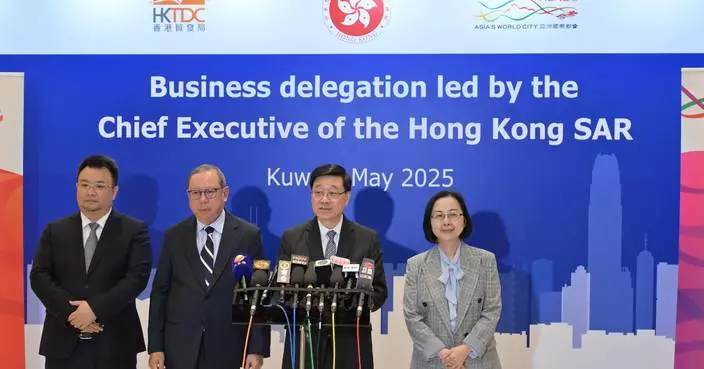Hong Kong's air quality continues to improve, bringing over 50 per cent reduction in long-term health risks
The Environmental Protection Department (EPD) announced today (March 21) an overview of Hong Kong's air quality in 2024.
Hong Kong's overall air quality in 2024 remained good andbroadly complied with Hong Kong's Air Quality Objectives. Owing to the efforts of the Hong Kong Special Administrative Region Government over the years, Hong Kong's air quality has continued to improve over the past 20 years, resulting in over a 50 per cent reduction in long-term health risks.
From 2004 to 2024, the annual average concentrations of respirable suspended particulates (PM10), fine suspended particulates (PM2.5), nitrogen dioxide (NO2) and sulphur dioxide (SO2) in the ambient air have reduced by 45 per cent to 88 per cent, whereas the annual average concentrations of these pollutants at the roadside have reduced by 36 per cent to 88 per cent. The annual average concentration of ozone (O3) has also gradually turned steady in the past few years (see Annex 1 for details). The number of hours of reduced visibility has greatly reduced by 82 per cent from its level in 2004 (Annex 2).
The EPD launched the Air Quality Health Index (AQHI) in 2014 to provide the public with daily updates on short-term health risks of air pollution, enabling the individuals to take necessary precautions to safeguard their health. In 2024, the percentage of hourly AQHI readings below 7 (i.e. within the "low" or "moderate" health risk categories) recorded by general and roadside monitoring stations improved from 96.1 per cent and 92.1 per cent when the index was first launched in 2014 to 98.7 per cent and 98.9 per cent, respectively.
Despite the increase in regional ozone levels, the significant improvement in Hong Kong's air quality has resulted in a continuous reduction in the associated long-term health risks. From 2004 to 2024, the improvement in air quality has led to over a 50 per cent reduction in long-term health risks (Annex 3).
Making reference to health risk data from hospital admissions associated with air pollutants over the past decade, the EPD will update the relevant risk factors assigned to relevant air pollutants. The EPD will also update the compilation methods of AQHI with reference to the latest guideline levels for air pollutants as set out in the latest air quality guidelines published by the World Health Organization, thereby providing more accurate information and warning forecast. The updated AQHI will come into effect on March 22, 2025. Detailed information on the updates will be made available to the public via the dedicated AQHI websitewww.aqhi.gov.hk/en/index.html.
An EPD spokesman said, "With the Government's continued promotion and implementation of the comprehensive air quality improvement measures put forth in the Hong Kong Roadmap on Popularisation of Electric Vehicles, the Clean Air Plan for Hong Kong 2035 and Hong Kong's Climate Action Plan 2050 announced in 2021, and the Green Transformation Roadmap of Public Buses and Taxis announced in 2024, including the promotion of electric vehicles, green transport and net-zero electricity generation, the overall air quality in Hong Kong will improve continuously."
DH responds to media enquiries on air-conditioning interruption in private hospital
In response to media enquiries regarding the air-conditioning interruption that occurred at St. Teresa's Hospital in July 2024 for about an hour, the Department of Health (DH) today (May 14) gave the following response:
Regulatory regime
--------------------
The DH regulates licensed private hospitals in accordance with the Private Healthcare Facilities Ordinance (Cap. 633) (the Ordinance). The Code of Practice for Private Hospitals (the CoP) issued by the Director of Health in accordance with the Ordinance sets forth licensing and operating standards for private hospitals, including the relevant requirements for hospital facilities and equipment.
The CoP stipulates that hospital installations and equipment must be kept in good operational order and requires hospitals to have contingency plans for emergencies (such as fire and the cessation of water or electricity supply). It also sets out that healthcare engineering systems (including electrical installations, specialised ventilation systems and medical gas supplies) must be properly maintained to meet the service need and ensure patient safety. Reportable events for private hospitals are also set out in the CoP.
The DH regularly reviews and updates regulatory standards for private healthcare facilities, together with the experts of the Advisory Committee for Regulatory Standards for Private Healthcare Facilities in accordance with the established mechanism of the Advisory Committee. The DH will also continue to review the CoP in accordance with the mechanism in order to protect the interest of the public.
Investigation work
---------------------
Regarding the incident at St. Teresa's Hospital, the DH was notified by a doctor on September 2, 2024, about an air-conditioning interruption in the operating theatres on the second floor of the hospital concerned in the evening of July 31, 2024, which lasted approximately one hour.
Although air-conditioning interruption is not a reportable event of private hospitals, the DH considered that the incident might have potential patient safety concerns and therefore promptly initiated an investigation on the same day (September 2, 2024) the notification was received. The DH sent staff to conduct an inspection at the hospital concerned, checked relevant documents, evaluated the effectiveness of its contingency measures, assessed the environmental condition of the operating theatres during the interruption and followed up on the remedial actions.
According to the investigation, the incident involved a malfunction of the air-conditioning system used to regulate the room temperature which lasted for about one hour. During which, 10 surgeries were performed in various operating theatres. The hospital explained that dehumidifiers were immediately deployed in the operating theatres where higher risk surgeries were being performed, including the one where the doctor was performing an operation. According to the hospital and the nurses on site, the severity of condensation in the operating theatre did not result in water dripping onto the surgical site of patients. The ventilation system used for infection control in the operating theatres (including air filtration equipment, hourly air change rate and a positive pressure environment) was operating normally. Apart from immediately responding to the incident, the hospital has also worked with its contractor to identify the cause of the incident and take measures to prevent recurrence of similar incidents.
In addition, the hospital conducted prompt follow-up by conducting air sampling of the operating theatres and surveillance on conditions of patients who underwent surgeries during the affected period for infection, with no abnormality detected. Based on the available evidence gathered, the DH considered that there was insufficient evidence to show that the hospital has breached the requirements of the Ordinance or the CoP.
Complaint handling
---------------------
The Ordinance also provides for a complaints handling mechanism against private healthcare facilities, which includes the establishment of the statutory Committee on Complaints Against Private Healthcare Facilities (Complaints Committee), with the DH serving as the Secretariat, to handle complaints lodged by patients against licensed private healthcare facilities (including private hospitals).
There were media enquiries on whether the DH had received any complaints from patients. According to the DH's existing records, the DH received a call on September 12, 2024, from a member of the public who enquired about the complaint procedure against private healthcare facilities, and mentioned the air-conditioning system of St. Teresa's Hospital was not functioning properly when underwent surgeries. The Secretariat explained to the enquirer the function of the Complaints Committee and statutory procedures of lodging a complaint promptly. The Secretariat on the following day (September 13, 2024) sent information on the complaint procedures with complaint form and statutory declaration form to the email address provided by the person as requested. The enquirer confirmed receipt of the concerned information and forms by email but since then, the Complaints Committee has not received any complaint from the concerned enquirer in relation to this incident.
The DH has completed investigation based on all available information, but will continue to closely monitor licensed private healthcare facilities. If there is new and concrete evidence, the DH will take appropriate actions as necessary to safeguard patient safety.
















































